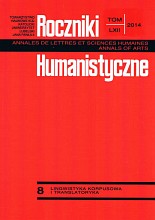Franciscus idiota – znaczenia kontekstowe i interpretacje hagiograficzne
Franciscus Idiota – Contextual Meanings and Hagiographic Interpretations
Author(s): Andrzej ZającSubject(s): Cultural history
Published by: Towarzystwo Naukowe KUL & Katolicki Uniwersytet Lubelski Jana Pawła II
Keywords: st. Francis of Assisi; idiota; hagiography; dittology; context; interpretation
Summary/Abstract: Among many epithets characterizing St. Francis of Assisi in medieval Latin literature the term idiota can be distinguished. Due to its semantic ambiguity, it is not only intriguing but, in the first place, presents difficulties to the translators. In response to a question about what the characteristics of a hero determined this way are, it is helpful to recall the etymology and original meanings of the Greek term ἰδιώτης and its biblical applications. Dittological self-definitions: ignorans et idiota, idiota et subditus, simplex et idiota used in the writings of Francis are claiming on careful analysis, not only at the semantic level, but also the syntactic and the pragmatic as well. Characteristic phrases adopted by biographers assume new functions typical of hagiographic literature. To understand them well, it is necessary to take into account the extra-textual knowledge concerning the existential situation of the author, the nature and purpose of his expression and the cultural context of the era. The complexity of these issues is the subject of this study.
Journal: Roczniki Humanistyczne
- Issue Year: 62/2014
- Issue No: 08
- Page Range: 93-110
- Page Count: 18
- Language: Polish

